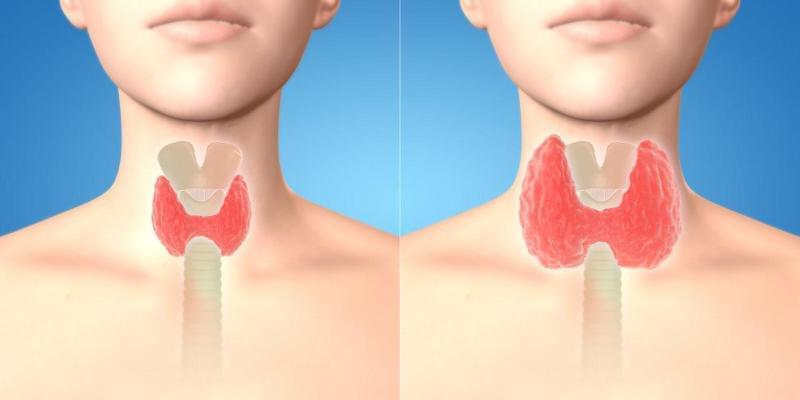
Thyroid Gland: Function, Disorders, and Treatment
The thyroid gland, located in front of the windpipe, consists of two butterfly-shaped lobes (each 2–3 cm in diameter) that produce hormones.
Thyroid Hormones and Their Role
The thyroid produces two hormones:
-
Triiodothyronine (T3)
-
Thyroxine (T4)
These hormones regulate metabolism and bodily functions. Their production depends on iodine, meaning iodine deficiency or impaired iodine utilization can lead to insufficient hormone production.
If the thyroid gland does not produce enough hormones, it gradually enlarges, forming nodules—areas with higher hormone production.
This condition is classified as:
-
Nodular or non-nodular goiter.
-
Non-nodular goiter varies based on hormone levels, leading to different diseases.
Common Thyroid Disorders
Hypothyroidism
-
Occurs when the thyroid produces insufficient hormones.
-
Chronic inflammation (Hashimoto’s thyroiditis) is often present.
-
Can result from iodine deficiency or poor iodine utilization.
Hyperthyroidism (Toxic Goiter)
-
Excessive hormone production, known as toxic goiter.
-
If no nodules are present, it is usually caused by an immune system overreaction (Graves' disease).
-
Toxic nodules or toxic multinodular goiter occur when one or more nodules excessively produce hormones.
Diagnosis and Follow-Up
-
Blood tests for T3, T4, and TSH hormone levels.
-
Thyroid ultrasound to assess gland structure.
-
Further tests, follow-ups, and treatment depend on results.
Most thyroid conditions can be monitored or treated with medication:
-
Levothyroxine (Levotiron, Euthyrox) for hypothyroidism.
-
Propylthiouracil (Propycil) or Methimazole (Thyromazol) for hyperthyroidism.
-
Medication is unnecessary if thyroid function and ultrasound findings are normal.
Surgical Treatment for Thyroid Diseases
Surgery may be needed for:
-
Uncontrolled toxic goiter,
-
Large goiter affecting swallowing or breathing,
-
Goiter growing into the chest cavity,
-
Suspicious nodules with potential thyroid cancer,
-
Confirmed thyroid cancer (diagnosed via biopsy).
Most thyroid surgeries involve partial or complete gland removal.
Thyroid Nodules and Cancer Diagnosis
-
Ultrasound assesses nodule characteristics.
-
Suspicious nodules (irregular borders, high blood flow, calcifications) may indicate cancer.
-
Fine-needle biopsy is performed on nodules larger than 1 cm.
-
If cancer is suspected or confirmed, surgery is required.
-
Most thyroid cancers fully heal after surgery and radioactive iodine therapy (also known as "atomic treatment").
Thyroid Surgery Risks
-
Low-risk procedure, but potential complications include:
-
1% chance of bleeding,
-
1–2% chance of calcium deficiency (numbness),
-
1–2% chance of temporary hoarseness.
-
-
Bleeding may require reoperation.
-
Calcium deficiency usually resolves within days or weeks.
-
Most cases of hoarseness due to nerve strain improve within days.
-
Hoarseness from nerve damage can recover in 6–7 months with therapy.
Advancements in Thyroid Surgery
Recently, new equipment helps surgeons visualize nerves controlling vocal cords, reducing post-surgical hoarseness risk to 0.1%.
Patients requesting this advanced technology can access it at our hospital.

